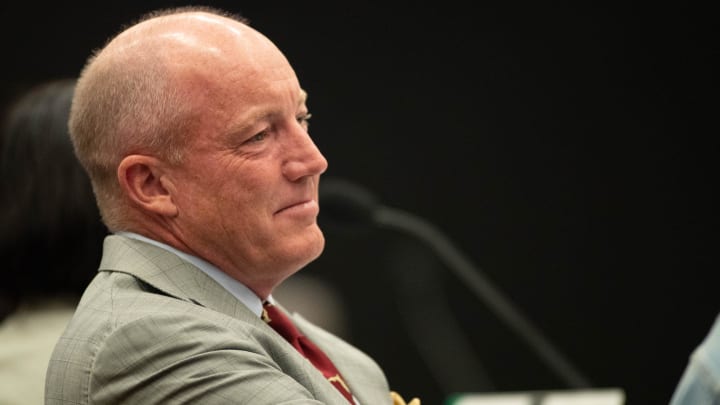Florida State University BOT Chair On ACC Revenue Sharing, Lawsuit: 'We Are Worth More'

Since late December, Florida State University’s nasty, public divorce with the Atlantic Coast Conference has seen everyone from athletic directors to TV analysts to college football fanatics share their take on the issue.
READ MORE: Former FSU Football Defender And Son Of Seminole Legend Transfers Out Of Tallahassee
FSU Board of Trustees Chairman Peter Collins – perhaps one of the most qualified to speak on this topic – became one of the most notable to give their opinion as he spoke at a Capital Tiger Bay Club’s luncheon on Monday.
According to the Tallahassee Democrat, Collins was firm in his stance that Florida State University deserves to receive conference and television contract payouts akin to those in the Southeastern Conference and the Big 10 Conference. It’s estimated there will be a $30-40 million difference in revenue (per institution) between schools in those conferences compared to ACC schools.
“At the end of the day, we are worth more than we are getting paid – a lot more than we are getting paid,” Collins said. “And I would challenge anybody to tell me that we’re not. To tell me that we’re worth the same amount as some of the other schools in the conference, from a media standpoint.”
Collins also mentioned that the “ultimate goal” of the lawsuit is to simply “get paid what we’re worth” but also designated the legal action as “an antitrust case.”
College football is used to landmark media rights cases. In the mid-80s, the Supreme Court ruled that schools (and ultimately conferences) have the right to negotiate their own media rights deals. Before then, the NCAA had almost total control over who plays on national TV and when. In fact, teams were only allowed to play on national TV once a year.
“I’ve seen every media statistic, every measurable fan base statistic, and we’re in the top five [nationally],” Collins said, at one point making a comparison to how athletes are now compensated for their name, image and likeness.
Moreover, schools such as former ACC member Maryland sued the ACC in 2013 over similar circumstances and ended up settling for $31 million.
“I think Florida State should get paid for its name, image and likeness,” said Collins. “And we are woefully underpaid.”
READ MORE: FSU Football Achieves Top-10 Spot in ESPN's Future Power Rankings
Stick with NoleGameday for more coverage of Florida State University throughout its ongoing legal battle with the ACC.
Follow NoleGameday on and Twitter, Facebook, Instagram, and TikTok
